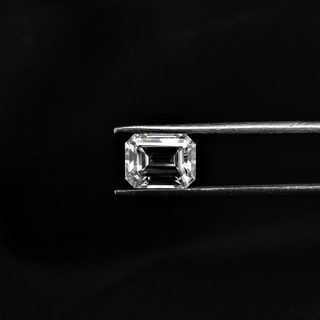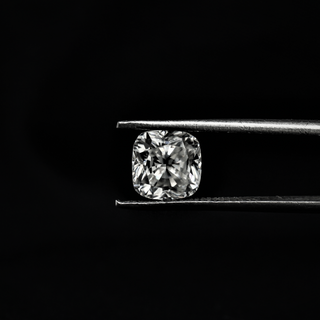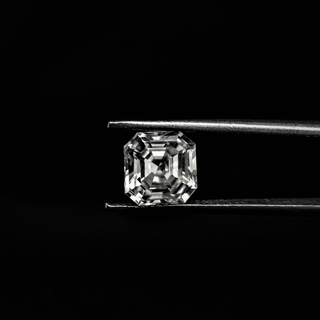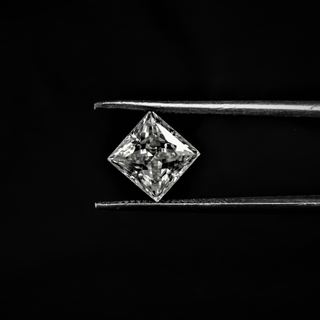A Brilliant Comparison Guide
When shopping for an affordable alternative to diamonds, two names often come up: moissanite and cubic zirconia (CZ). Both gemstones offer sparkle at a fraction of the cost of natural diamonds, but they are not the same in quality, appearance, or durability. So, which is the better option?
If you’re deciding between moissanite and cubic zirconia for a ring or other jewelry, this guide will walk you through every important difference, appearance, value, strength, and more, so you can make the right choice for your style and budget.
What Is Moissanite?
Moissanite is a lab-created gemstone made of silicon carbide. While it was first discovered in 1893 by French chemist Henri Moissan in a meteor crater, natural moissanite is too rare for commercial use. Today’s moissanite is grown in labs and is valued for its diamond-like appearance, extreme durability, and exceptional brilliance.
Read More:- What is Moissanite? - Full Guide
What Is Cubic Zirconia?
Cubic zirconia, or CZ, is a synthetic crystal made from zirconium dioxide. It has been widely used in costume and fine jewelry since the 1970s. While it mimics the appearance of a diamond, it’s much softer, less durable, and more likely to scratch or become cloudy over time.
Moissanite vs. Cubic Zirconia: Key Differences

Where moissanite is a beautiful gem cubic zirconia is also a versatile choice but less than a moissanite come let's understand how by comparing their Features
Brilliance
Moissanite: Higher than diamonds (RI: 2.65–2.69)
Cubic Zirconia: Lower brilliance (RI: 2.15–2.18)
Fire (Color Sparkle)
Moissanite: Very high, rainbow-like
Cubic Zirconia: Moderate
Hardness
Moissanite: 9.25 on Mohs scale
Cubic Zirconia: 8.0–8.5 on Mohs scale.
Durability
Moissanite: Excellent; suitable for daily wear
Cubic Zirconia: Poor; scratches and chips easily
Weight
Moissanite: Lighter than Cubic zirconia
Cubic Zirconia: Heavier than diamond and moissanite
Cost
Moissanite: $60–$100+ (based on size/grade)
Cubic Zirconia: $10–$50 (very low cost)
Lifespan
Moissanite: Lifetime with care
Cubic Zirconia: 1–3 years before signs of wear appear
Clouding Over Time
Moissanite: Does not cloud
Cubic Zirconia: Can cloud or yellow with age
Heat Resistance
Moissanite: Very heat-resistant
Cubic Zirconia: Sensitive to high temperatures
Which One Looks More Like a Diamond?

Moissanite Wins in Realism
While both stones are diamond simulants, moissanite comes much closer in appearance to a real diamond. Its clarity and brilliance often rival or exceed diamonds, and it doesn’t show wear over time. Cubic zirconia, while bright initially, lacks depth and can appear glassy.
Under light, moissanite produces more rainbow fire than diamonds, which some love and others find too “flashy.” Still, moissanite's brilliance holds up even after years of wear—something cubic zirconia cannot promise.
Durability and Long-Term Wear Between Moissanite and Cubic Zirconia
If you're planning to wear your jewelry daily, such as an engagement ring or wedding band, durability is critical.
Moissanite is second only to diamond in hardness. It's ideal for everyday rings, earrings, or pendants.
Cubic Zirconia scratches easily, becomes dull over time, and can chip with everyday wear.
Tip by Loose Moissanite: choose Moissanite for far superior durability.
Price Comparison Between Moissanite and Cubic Zirconia

A 1-carat moissanite stone generally costs between $60 and $100.
A 1-carat cubic zirconia can be as cheap as $10 to $50.
If your goal is ultra-low cost and short-term use, cubic zirconia is unbeatable. But if you want long-term value and realistic sparkle, moissanite offers better investment for your money.
Ethical and Environmental Considerations Between Moissanite and Cubic Zirconia

Both moissanite and cubic zirconia are lab-created, making them conflict-free and environmentally friendly compared to mined diamonds.
Moissanite often has stricter quality control and certification, especially from trusted brands.
Cubic zirconia production is mass-scale and may lack uniform quality, especially from unverified sources.
Why Choose Moissanite Over Cubic Zirconia?

1. Realistic Appearance:
Moissanite looks closer to a diamond and retains its brilliance for life.
2. Greater Longevity:
With proper care, a moissanite ring can last decades without losing clarity or sparkle.
3. Resale and Sentimental Value:
Moissanite holds value longer and is ideal for sentimental pieces like engagement rings.
4. Luxury Feel:
Moissanite gives you the feel of fine jewelry; Cubic zirconia often feels like costume jewelry.
5. Certification and Warranties:
Most Moissanite comes certified; CZ typically doesn’t.
When Is Cubic Zirconia a Better Option?
If you're buying a temporary piece, experimenting with style, or purchasing jewelry for a child or one-time event, CZ is a cost-effective choice. It offers sparkle without financial commitment—but just don't expect it to last forever.
Conclusion
While both moissanite and cubic zirconia offer diamond-like appearances at affordable prices, moissanite is clearly the better gemstone in terms of beauty, durability, and overall value. It’s ideal for engagement rings, everyday wear, and gifts that are meant to last.
Cubic zirconia is more suited for temporary or occasional jewelry pieces due to its limited lifespan. If you're looking for a long-term, sustainable, and sparkling alternative to diamonds, moissanite is the clear winner.





